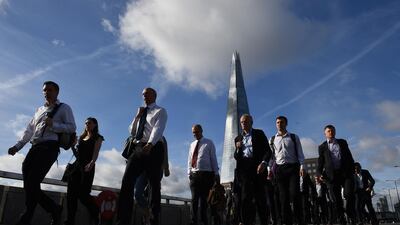The pace of Britain’s economic recovery eased slightly in June but price pressures jumped by the most on record, according to the latest Purchasing Managers’ Index from IHS Markit/CIPS.
The composite PMI, considered a good gauge of economic health, dipped to 62.2 from May's 62.9 – the highest reading since the series began in January 1998 – while a separate index for the services sector slipped to 62.4 in June from 62.9 in May.
The figures are still well above 50, the level that separates growth from contraction.
Tim Moore, director at IHS Markit, said the UK service sector recovery remained in full swing during June as looser Covid-19 pandemic restrictions released pent up demand for business and consumer services.
“Sales growth eased slightly from May’s recent peak but capacity constraints and staff shortages meant that many service providers struggled to keep up with new orders,” he said.
Britain's economy contracted by about 10 per cent in 2020 as the country suffered one of the highest Covid-19 death tolls in the world.
This year, it is expected to grow faster than the US and other advanced economies, with the Bank of England expecting a rebound of 7.25 per cent in 2021, boosted by the country’s rapid Covid-19 vaccination programme and sizeable monetary and fiscal stimulus.
While job creation hit its quickest pace in seven years, staff shortages contributed to the highest level of backlogs since the survey began in 1996. That in turn helped to push up prices by the most on record for inputs and prices charged.
"Difficulties filling staff vacancies were reported by survey respondents in all parts of the service economy during June, with hospitality and leisure experiencing the greatest squeeze,” said Mr Moore.
"Staff shortages and delays among suppliers were by far the most commonly cited constraints on growth in June.”
Another source of anxiety for businesses was the UK’s international travel restrictions, which are causing uncertainty about quarantine policies both at home and overseas.
These disruptions to inbound and outbound travel contributed to another slight dip in export sales, which stood in sharp contrast to resurgent domestic demand.
"The latest survey data highlighted survey-record rates of input cost and price-charged inflation across the service sector, reflecting higher commodity prices, transport shortages and staff wages,” said Mr Moore.
“Imbalanced supply and demand was the main driver, while the rollback of pandemic discounting by some service providers amplified the latest round of price hikes."
Despite inflation now running above its 2 per cent target, BoE governor Andrew Bailey said last week that was no need to panic about rising prices as the rise in inflation was "temporary".
“It is important not to overreact to temporarily strong growth and inflation, to ensure that the recovery is not undermined by a premature tightening in monetary conditions,” said Mr Bailey.
Separately, eurozone businesses expanded activity at the fastest rate in 15 years in June as Covid-19 restriction easing pumped energy back into the bloc's dominant service industry.
The IHS Markit final composite PMI reading jumped to 59.5 last month, from May's 57.1, its highest level since June 2006.
Again, that surge in growth has come at a cost as inflationary pressures mounted due to labour shortages and disruptions to supply chains caused by the pandemic.
chief business economist at IHS Markit
"Europe's economic recovery stepped up a gear in June but inflationary pressures have also ratcheted higher," said Chris Williamson, chief business economist at IHS Markit.
"Business is booming in the euro zone's service sector. Added to the impressive growth seen in the manufacturing sector, the PMI surveys suggest the region's economy is firing on all cylinders as it heads into the summer."
Mateusz Urban, an economist at Oxford Economics, said the index confirms that the recovery in bloc’s economy is “well under way”.
“Germany and France saw their composite PMIs well in expansionary territory, at 60.1 and 57.4, respectively. The readings were buoyed especially by services sectors,” Mr Urban said.
However, backlogs and producer price pressures show no signs of abating.
“Surveyed firms pointed to an increase in costs translating into higher prices for their clients, which is likely to translate into a pickup in the underlying price pressures across the eurozone in the coming months,” said Mr Urban.
European Central Bank policymaker Isabel Schnabel said on Saturday that it is “necessary and proportionate” that inflation overshoots the institution’s goal for a while as the economy recovers.
“Years of repeated overprediction of the future path of inflation require that higher inflation prospects need to visibly migrate into the baseline scenario and be reflected in actual underlying inflation dynamics,” she said.
“Such patience may lead to inflation outcomes being moderately above our aim for a temporary period of time. This will be a necessary and proportionate requirement to set the conditions to escape low inflation.”


